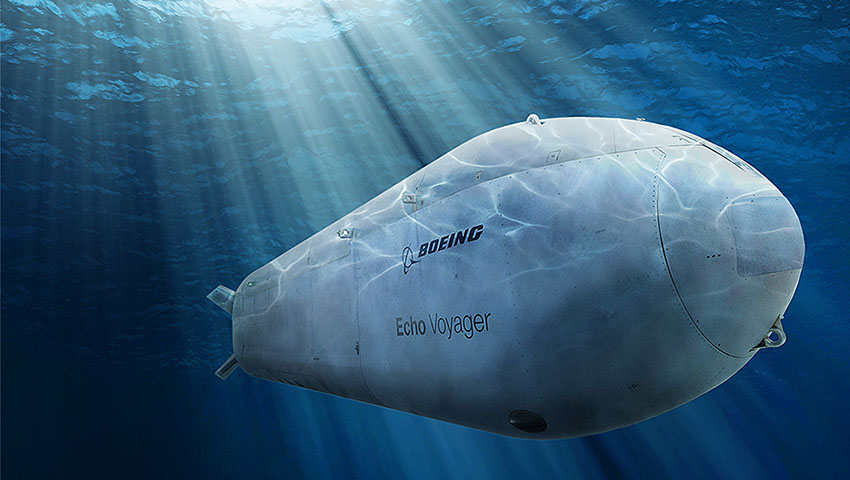Boeing has been awarded a US$43 million deal to construct four Orca extra large unmanned undersea vehicles (XLUUV) for the US Navy.
To continue reading the rest of this article, please log in.
Create free account to get unlimited news articles and more!
The US Navy is ordering the four test vessels that are based on Boeing's 50-foot-long Echo Voyager unmanned design, a diesel electric vessel that will be known as the Orca XLUUV when in service with the US Navy.
Echo Voyager is a fully autonomous XLUUV class that can be used for a variety of missions that were previously impossible due to traditional UUV limitations.
Echo Voyager is complete with an extensive internal and external payload volume and available energy capacity, expanding the parameters of what is possible in current unmanned undersea systems. The vehicle’s advanced autonomy enables it to perform at sea for months at a time, delivering a more affordable, mission-capable solution over traditional UUVs.
Boeing has designed and operated manned and unmanned deep sea systems since the 1960s, including Rockwell International legacy systems and US Navy support programs. Prior to Echo Voyager, Boeing developed Echo Seeker and Echo Ranger, autonomous and large UUVs as test beds for its current XLUUV.
The Echo Voyager's advanced autonomous systems allow it to operate effectively in clear and congested waters without any direct support from the deploying 'mothership' and enjoys a number of next-generation capabilities, including:
- Endurance: Echo Voyager’s range covers 6,500 nautical miles (one fuel module), allowing the vehicle to perform long endurance operations.
- Host ship independent: Echo Voyager is not launched from or recovered to a support vessel, nor does it require a support vessel for operation.
- Modular: The 51-foot-long vehicle is designed to incorporate a modular payload section for multiple uses up to 34 feet in length and 2,000 cubic feet in volume, and can include payloads extending outside of its envelope.
- Navigation: The XLUUV’s navigation system features a proven Kalman filter inertial navigation unit supported by Doppler Velocity Logs and depth sensors offering superior directional accuracy.
UUVs, due to their limited endurance, require host platforms for launch and recovery. That reliance results in significant size restrictions limiting on-board power availability, precluding incorporation of redundancy for long-term operations and reducing payload capacity. At the same time, new sensor and system payloads are rapidly being introduced that could expand the UUV mission set.
Viable, cost-effective UUVs providing endurance capabilities and meeting modular payload requirements for varied missions are needed to support the demonstration and refinement of capabilities in open ocean environments.
Boeing describes the Echo Voyager as a 'game-changing' platform, capable of performing as a multi-mission system, playing a pivotal role in future force structure, and leveraging advanced autonomous technologies to operate for months at a time.

 Login
Login







